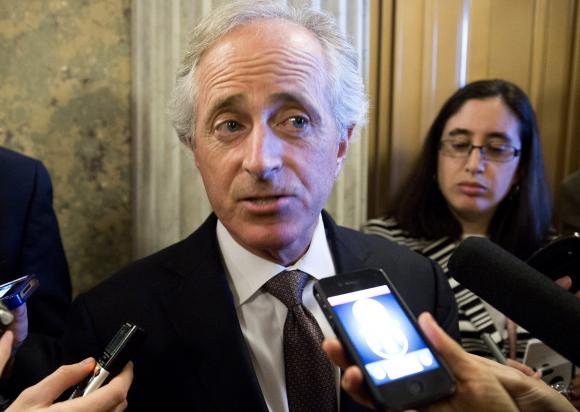 Senator Bob Corker (R-TN) speaks to reporters during the 14th day of the partial government shut down in Washington in this file photo taken October 14, 2013.
Senator Bob Corker (R-TN) speaks to reporters during the 14th day of the partial government shut down in Washington in this file photo taken October 14, 2013.CREDIT: REUTERS/JOSHUA ROBERTS/FILES[/caption]
(Reuters) - The U.S. Senate Foreign Relations Committee could vote as soon as next week on a bill requiring President Barack Obama to submit any nuclear agreement with Iran for Congress' approval, the panel's chairman, Republican Senator Bob Corker, said on Monday.
Obama has threatened to veto the bill, saying it impinged on presidential authority and could disrupt the talks.
Corker told reporters at the U.S. Senate that he planned to move ahead with the legislation in the committee next week.
Aides to Corker and the committee's top Democrat, Senator Robert Menendez, said the panel had not yet settled on a specific date to debate and vote on the bill. Menendez must also agree on a date for the panel to consider the legislation.
The Foreign Relations panel must approve the bill before it can be considered by the full Senate. The full-Senate vote is unlikely to take place before mid-April because next week is the last opportunity before lawmakers leave Washington for a two-week recess.
The measure would also have to be approved by the House of Representatives to be sent to the White House for Obama's signature or veto. It would need the support of two-thirds of both the Senate and House to overcome a veto.
The Senate's Republican leaders moved to bypass the committee and submit the vote to the full Senate earlier this month. But they agreed to postpone any action after many Democrats, including some of the bill's co-sponsors, objected to voting before the late-March deadline that international negotiators set for reaching a framework nuclear deal.
U.S. Secretary of State John Kerry and Iranian Foreign Minister Mohammad Javad Zarif held nearly five hours of talks on Monday in the Swiss city of Lausanne, inching closer to a possible agreement.
The legislation would require Obama to submit a final nuclear agreement to Congress and restrict his authority to waive sanctions for 60 days so lawmakers have time to weigh in.
By Reuters










